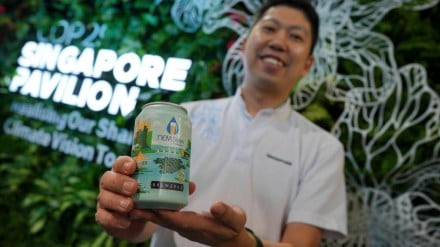At the bustling pavilion of COP29 in Azerbaijan, among the vibrant displays of countries and organizations showcasing climate innovations, a modest display from Singapore is quietly stealing the spotlight. The attraction? A refreshing can of beer — NEWBrew — offered to passersby. But this is no ordinary beer; it’s brewed with treated wastewater, a revelation that’s both surprising and thought-provoking for many attendees.
“I didn’t know. I was really surprised,” said Ignace Urchil Lokouako Mbouamboua, a student from Congo. For Mbouamboua, the beer is not just a drink but a symbol of innovation. “I can even suggest that they make more and more of this kind of beer,” she added.
NEWBrew is a product of Singapore’s innovative water management strategy, incorporating NEWater — treated and purified wastewater. This initiative is part of the city-state’s broader efforts to tackle water scarcity, a challenge it has faced due to its lack of natural water sources.
Singapore’s approach combines water imports from Malaysia with advanced catchment, desalination, and recycling systems. Treated wastewater has become integral to its national water strategy, addressing the increasing demand expected to double by 2065.
For Singaporeans, drinking NEWater isn’t a novelty. Public campaigns to normalise its use date back decades, including a memorable 2002 photograph of then-Prime Minister Goh Chok Tong drinking NEWater after a tennis match.
From innovation to reality
The beer was first developed in 2018 by The Brewerkz Group, a local brewery, to showcase NEWater at Singapore’s International Water Week. Since then, it has become a niche product, with around 15,000 cans produced annually. Retailing at about 7 Singaporean dollars (USD 5), NEWBrew is brewed using traditional processes, making it indistinguishable from conventional beer in taste and quality.
Highlighting NEWBrew at COP29 also sheds light upon the growing importance of water recycling in the face of climate change. “There’s increasing acceptance of treated wastewater,” noted Saroj Kumar Jha, director of the World Bank Group’s global water department. He emphasized the shift toward rebranding “wastewater” as “used water” to reduce stigma.
(With inputs from AP)
